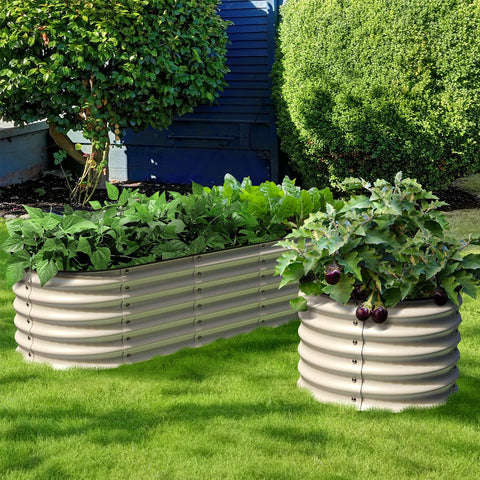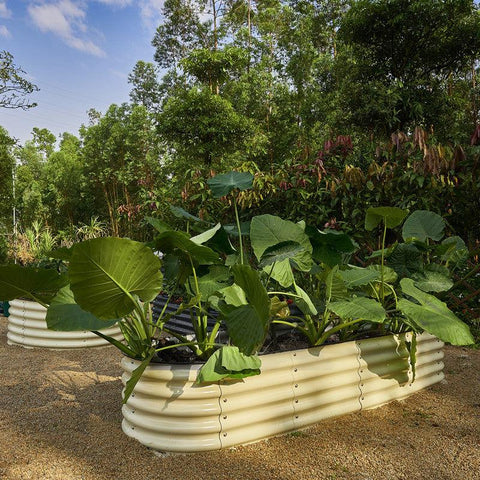Why Do You Put Plastic In The Garden and Garden Beds?
Black plastic mulch preserves soil moisture by preventing evaporation of soil moisture. Only the bare soil in the hole where vegetable plants grow will lose water evaporation. This means that there is more water in the surrounding soil available for plant roots, and you spend less time watering growing crops.Use these guidelines from Olle Garden Beds to find the best ways for your needs.
Should I put plastic in my garden?
Yes, it really warms the soil, prolongs the growth time of crops, maintains water in the soil and suppresses excessive weeds. No, black plastic is not organic. Most black plastic will eventually enter the landfill in a season or two - unless you use one of the newer biodegradable or photo degradable black plastic coverings.

Why do farmers use black plastic?
Black plastic mulch preserves soil moisture by preventing evaporation of soil moisture. Only the bare soil in the hole where vegetable plants grow will lose water evaporation. This means that there is more water in the surrounding soil available for plant roots, and you spend less time watering growing crops.
Does red plastic help tomatoes grow?
Product description. The red plastic mulch is mainly used for the early harvest of tomatoes. According to the researchers, when tomatoes grow on red mulch, they yield more, have stronger stems, and mature earlier.
Can roots grow through plastic?
Plastic is impermeable, which means it does not allow air (or water) to enter the soil and reach the root. Plastics create an anaerobic (low oxygen) environment. Without soil oxygen, plants will suffocate and die.
Is plastic better than landscape fabric?
Garden green fabric is a durable product between the two. It is more expensive and has a stronger overall structure. There are also different types of landscape fabrics, each of which has a specific purpose. On the other hand, black plastic is mainly used to eliminate weed growth.
What's the use of black plastic cloth?
Our black plastic film has a variety of varieties, sizes and mils, which can be used for landscaping, organic gardening, building and general protection against dust, moisture and dirt. The black plastic visqueen is an ideal choice for garden sunshine, because it is a strong absorber of sunlight and can become very hot.
Can plants grow under plastic?
The plants under the plastic bags can keep water and even capture the things produced by plants through transpiration. However, do not use plastic bags as a greenhouse for succulent plants, because they can absolutely tolerate neglect, but will not tolerate this moisture.
Can I use white plastic in the garden?
If the long-term forecast temperature is higher than the normal temperature, it is recommended to lay white or reflective plastic on sensitive crops in early June. White mulch also shows benefits in cold season crops planted in spring, such as broccoli, lettuce, onions and sun neutral strawberries planted in April.
Why do people put plastic under the soil?
Both landscape fabrics and plastic mulch help reduce soil erosion and prevent weeds, while keeping the soil in place and preventing weeds from sprouting.
Do I need to put plastic under the cover?
When using mulch in your landscape, you do not need to use artificial weed barriers, such as plastic or landscape fabrics. These materials do not work and are not a weed barrier. They are necessary only under the stone. This is to prevent soil from mixing with stone.
Should you put plastic on the floor of the crawl space?
A: A plastic cover or vapor barrier is definitely necessary, especially in the muddy floor crawl space. If there is no vapor barrier, water will migrate to the soil surface and eventually cause serious problems in the crawling space, including mold and possible structural decay. The plastic shall cover the entire floor.
How do I use plastic in my garden?
Using black plastic mulch on the surface of the garden plot will greatly reduce this work. The plastic will help prevent evaporation of the water below, and it can suffocate any weed that may try to germinate and steal nutrients from the soil around the plant.
Will black plastic warm the soil?
Alkaline black plastic can heat the soil from 5 to 7 degrees to a depth of 2 inches below the surface of the soil. Transparent plastic will further increase the soil temperature - up to 14 degrees - but its transparency does allow weeds to grow beneath it.
How do you deal with plastic in the soil?
An effective way to reduce the amount of plastic bags and bottles brought into the garden is to make your own fertilizer, often called compost. If you haven't turned food scraps and garden garbage into nutrient rich soil additives that plants like, you will miss it.

Can plastic prevent weeds from growing?
Yes, you can use plastic to kill weeds. This technology is called mulching or soil insolation, which is a great organic matter (yes, plastic is not environmentally friendly, but it can be saved and reused again and again), and there is no way to make a fuss about removing potential garden space weeds.
How do you clear the garden?
- Work smart, not hard. This may mean several things.
- Purchase appropriate equipment.
- Don't be superficial.
- Pick up garbage first.
- Trim the lawn.
- Take care of your yard.
- Compost with weeds.
- Start with a quick scan.
How long can landscape plastics last?
Keep away from weeds without using chemicals – it is designed to provide you with up to 25 years of service without decomposition. It also provides excellent erosion control. Due to the braided design, water flows easily, but nothing can grow underneath.
Is transparent plastic or black plastic more suitable for killing weeds?
Black plastic will not raise soil temperature like transparent plastic, nor will it kill pathogens or fungi. But it can kill weeds more effectively. Black plastic blocks sunlight and prevents plants from producing sugar through photosynthesis, but it takes longer to kill weeds with black plastic than with transparent plastic.
